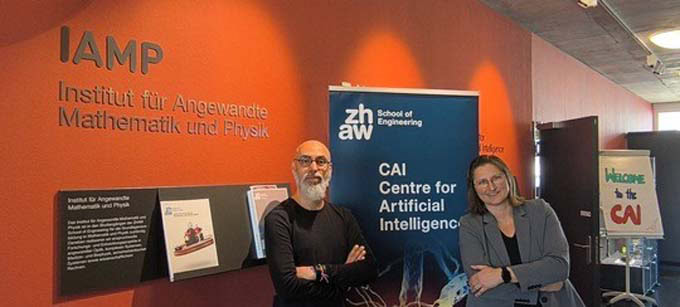Digital competitiveness: Switzerland remains in 5th place
The Institute for Management Development in Lausanne (IMD) published its global ranking of "Digital Competitiveness" last week. Switzerland secured 5th place out of 64 countries surveyed for the second time in a row. The results for Switzerland were explained in more detail on November 30 at the World Digital Competitiveness Forum 2023, which was organized by digitalswitzerland, IMD and EPFL at EPFL's SwissTech Convention Center.

After being overtaken by Denmark in 2022, the USA is back at the top of the rankings in 2023. Denmark, on the other hand, dropped three places to 4th place. The Netherlands climbed to second place (from 6th place), while Singapore improved by one place (3rd place).
Switzerland is making progress
The world ranking on "Digital Competitiveness" assesses an economy's ability and willingness to use and explore digital technologies as a key driver of economic change in business, government and society in general. The researchers assess digital competitiveness based on three main categories or factors: Knowledge, Future Readiness and Technology. Switzerland's solid position in the ranking is due to its excellent score in the knowledge factor. The World Competitiveness Center defines this as "the necessary know-how to discover, understand and develop new technologies". In the other two categories, Switzerland was able to improve slightly compared to the previous year, although there is still potential.
Top rank in knowledge
Switzerland ranks in the top 10 in all sub-categories in the area of knowledge, especially in terms of talent, where it takes second place. The international experience of the workforce and the proportion of highly qualified talent from third countries contribute to this ranking. In terms of scientific concentration, Switzerland is now in 10th place (2022: 8th place) and in the area of education and training in 7th place (2022: 8th place). In the area of technology, Switzerland rises to 10th place (2022: 12th place). This is mainly due to improvements in the regulatory framework - Switzerland ranks 4th in this sub-factor (2022: 8th place).
"For many years, digitalswitzerland's mission has been to transform Switzerland into a leading digital nation. The population's attitude towards technology is a crucial component in this regard. We want to sensitize and encourage the population to embrace and use digital innovations. A focus on education and training, especially in the area of digital skills, is crucial. This should - more than ever - start at a young age in order to create a broad basis of digital skills," says Marc Walder, founder of digitalswitzerland.
Switzerland's pent-up demand and missed opportunities
According to the report, there is also great potential for improvement in the population's attitude towards technology. Switzerland ranks 16th here. Prof. Arturo Bris, Director of IMD's World Competitiveness Center, explains: "Switzerland rejected the e-ID law; the use of the COVID online application was very low; concerns about data protection are high; and digital banking is not as developed as in many other countries. This reflects Switzerland's culture of technology adoption at an individual level, which is much lower than in other
countries, even though Switzerland has an excellent digital infrastructure, solid regulation and digital talent, and companies are also very agile when it comes to implementing digital transformation."
Switzerland also needs to improve in the categories of cybersecurity (20th place) and state cybersecurity capacities (28th place): In the wake of the pandemic, the use of digital technologies increased, but a similar improvement in the area of cybersecurity could not be observed. This is particularly dangerous in view of the ever-increasing number of cyberattacks on companies and private individuals.
"We really are at a crossroads when it comes to the acceptance of technology. In the case of Switzerland, I find the poor provision of e-government and e-participation particularly worrying. It's time we tackled this issue at the highest level," says Sascha Zahnd, President of digitalswitzerland.
Generative AI defines the competitiveness index of companies and therefore of countries new
Further insights were provided by a panel discussion at the "World Digital Competitiveness Forum", which was hosted by digitalswitzerland, IMD and EPFL on November 30. The guests discussed the following questions: "Do the latest disruptive digital technologies such as generative AI signal a quantum leap in the field of further education? What impact will this have on the world of work - and consequently on each and every one of us?"
"Partnerships like this one between digitalswitzerland, EPFL and IMD will lead us successfully into the era of generative AI. The next step in this partnership is a comprehensive white paper on the state of Gen AI in Switzerland, which will be published next week. We are only at the beginning in terms of collecting data and are just starting to understand what lies ahead" - with these words, Sarah Toms, Chief Learning Innovation Officer at IMD, bids farewell to the participants of the World Digital Competitiveness Forum.
Source: www.digitalswitzerland.com









